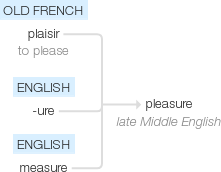Pleasure
late Middle English: from Old French plaisir ‘to please’ (used as a noun). The second syllable was altered under the influence of abstract nouns ending in -ure, such as measure .
wiktionary
From Early Modern English pleasur, plesur, alteration (with ending accommodated to -ure) of Middle English plaisir(“pleasure”), from Old French plesir, plaisir(“to please”), infinitive used as a noun, conjugated form of plaisir or plaire, from Latin placeō(“to please, to seem good”), from the Proto-Indo-European* pleh₂-k-(“wide and flat”). Related to Dutch plezier(“pleasure, fun”). More at please.
etymonline
pleasure (n.)
late 14c., plesire, "source of enjoyment, pleasing quality or thing, that which pleases or gratifies the senses or the mind," from Old French plesir, also plaisir "enjoyment, delight, desire, will" (12c.), from noun use of infinitive plaisir (v.) "to please," from Latin placere "to please, give pleasure, be approved" (see please (v.)).
Also from late 14c. as "discretion, will, desire, preference," as in at (one's) pleasure "when one wishes." From mid-15c. as "gratification; feeling of enjoyment, liking." The meaning "sensual gratification" is from early 15c. That of "indulgence of the appetites as the chief object of life" is attested from 1520s. The ending was altered in Middle English by influence of words in -ure (measure, etc.).
pleasure (v.)
1530s, "to take pleasure in;" 1550s as "give pleasure to," from pleasure (n.). Sexual sense by 1610s. Related: Pleasured; pleasuring.
